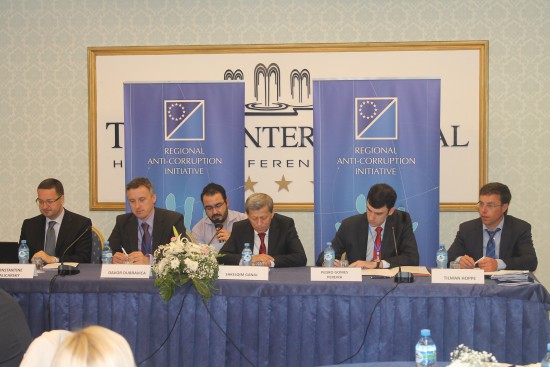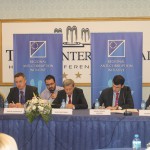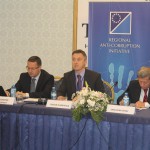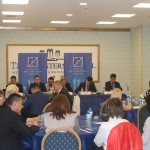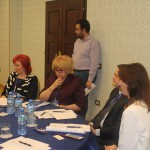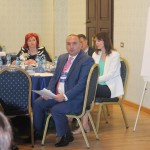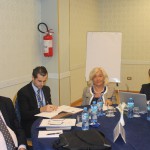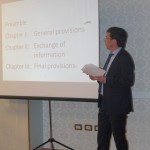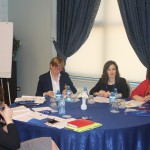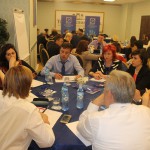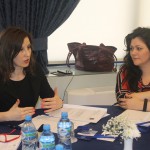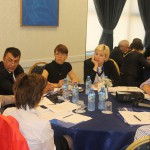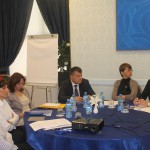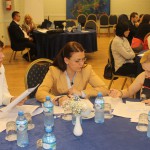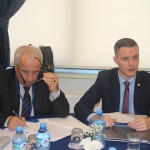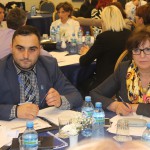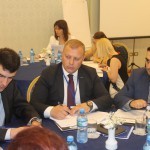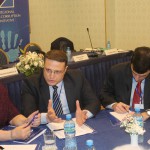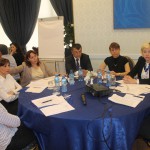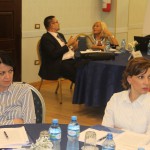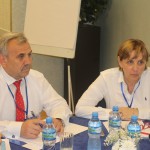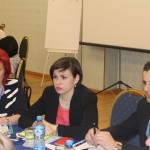Regional Meeting of the Oversight Bodies for Asset Disclosure & Conflict of Interest – May 23, 2016 – Tirana, Albania
Regional Anti-corruption Initiative, in collaboration with the High Inspectorate of Declaration and Audit of Assets and Conflict of Interest in Albania, and supported by the Austrian Development Agency, organized the Regional Meeting of the Oversight Bodies for Asset Disclosure and Conflict of Interest on May 23, 2016 in Tirana, Albania.
The main objective of the event was to strengthen regional cooperation in the field of asset disclosure and conflict of interest by discussing the mechanism enabling data exchange between the Oversight Bodies of the South East Europe. High level representatives of ministries of justice and oversight bodies from Albania, Bosnia and Herzegovina, Bulgaria, Croatia, Kosovo*, Macedonia, Moldova, Montenegro, Romania and Serbia discussed a draft legal instrument on exchange of data for verifying asset declarations.

The meeting was opened by Mr. Flori Karaj, Secretary General of the High Inspectorate of Declaration and Audit of Assets and Conflict of Interest, who welcomed all participants and stressed out the importance of the regional cooperation in the field of conflict of interest prevention and asset disclosure. He also informed about recent developments and results in Albania, particularly in terms of public communication improvement, increase of public trust and effectiveness in sanctions imposing. Mr. Karaj underlined the need to exchange data on regional level, as well as to discuss all challenges and obstacles in this regard.
Mr. Davor Dubravica, RAI Chairperson, welcomed all participants and emphasized that the event was a follow-up to the Meeting held in Zagreb in December 2015. Mr. Dubravica pointed out that the initiative to develop a legal instrument on data exchange between Oversight Bodies in the South East Europe is unique even at the global level.
On behalf of the Basel Institute on Governance, Mr. Pedro Gomes Pareira expressed his gratitude for the invitation to the Meeting and stressed the importance of the legal instrument which could enable exchange of data and lead to a more effective cooperation in the field of asset disclosure. He also elaborated on the main elements with regard to asset disclosure system, such as checking accuracy of the information, verification of typology, and identification of potential wrongdoing. It was specified that communication and information sharing enabled better prevention and quicker identification of wrongdoing.
Mr. Constantine Palicarsky, UNODC, presented main principles and provisions on cooperation in administrative matters, stipulated by the UN Convention against Corruption (UNCAC), referring to the Article 43 in particular. Mr. Palicarsky pointed out the Resolution 6/4, adopted at the sixth Session of the Conference of the States Parties (CoSP), which called upon enhancing the use of civil and administrative proceedings against corruption, including through international cooperation, in the framework of the UNCAC. He informed participants about UNODC efforts, available tools and resources, which could be helpful for state parties in the implementation of the UNCAC.
The first draft of the Regional Legal Instrument on Data Exchange in the field of Asset Disclosure and Conflict of Interest was presented by Dr. Tilman Hoppe, Anti-corruption Expert. Dr. Hoppe reflected upon the OECD “Agreement on Exchange of Information on Tax Matters”, as an effective model of transnational cooperation in civil matters which had been used by more than 100 states. He elaborated on the main elements of the Draft Instrument, such us exchange of information, possibility of declining a request, data protection and confidentiality etc. Additional clarifications were provided to the participants upon their questions and remarks. Several concerns were raised by respective countries’ representatives, such as confidentiality and classified data, consistency of the Draft Instrument with the national legislation, bank secrecy, eligibility to use data in different proceedings, personal data protection and sharing of data on tax matters.
During the next session, within thematic focus groups, participants discussed different aspects of the Draft Instrument, focusing on the following:
1) Categories of data that can be exchanged;
2) Confidentiality of data;
3) Procedural aspect of data exchange;
4) Grounds for refusal to provide data.
Each group presented outcomes of their discussions, including specific recommendations and proposals for the Draft Instrument. Special attention was given to issues such as random and targeted checks, list of data to be requested, access to information and registers, usage of open source information, dual citizenship, language to be used in requests to obtain data, cooperation among relevant bodies within countries, need for definitions within the Draft Instrument etc.
Main conclusions of the Meeting read that the Draft Instrument would be revised according to the comments and proposals at the meeting and would be sent again to all participants. The Draft Instrument should be also shared with ministries of justice in respective countries. RAI Secretariat engaged to prepare an analysis of databases the asset declaration/conflict of interest agencies have access to. Particularly, it will examine whether those databases are public or private (free or paid access) and what is required to access them; what language(s) those databases provide information in and what are the search parameters in databases. Participants also stressed the need to involve international organizations and NGOs in the further process of development of the Draft Instrument.
The meeting was closed by Mr. Davor Dubravica, RAI Chairperson, who thanked all participants for the active collaboration and contribution to the meeting’s discussion. He also informed that the next meeting would be organized by RAI in the second half of 2016.
For more details, please download Meeting Agenda and List of Participants.
∗ This designation is without prejudice to positions on status, and is in line with UNSC 1244 and the ICJ Opinion on the Kosovo Declaration of Independence.
Photo Gallery

